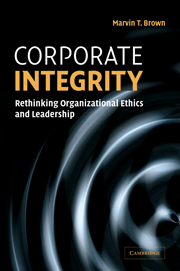Book contents
- Frontmatter
- Contents
- Preface
- 1 The context for corporate integrity
- 2 Cultural integrity as openness
- 3 Interpersonal integrity as relational wholeness
- 4 Organizational integrity as pursuing a worthwhile purpose
- 5 Social integrity as civic cooperation
- 6 Environmental integrity as natural prosperity
- 7 Corporate integrity and organizational leadership
- Appendix: Assessment worksheets
- Bibliography
- Index
1 - The context for corporate integrity
Published online by Cambridge University Press: 05 September 2012
- Frontmatter
- Contents
- Preface
- 1 The context for corporate integrity
- 2 Cultural integrity as openness
- 3 Interpersonal integrity as relational wholeness
- 4 Organizational integrity as pursuing a worthwhile purpose
- 5 Social integrity as civic cooperation
- 6 Environmental integrity as natural prosperity
- 7 Corporate integrity and organizational leadership
- Appendix: Assessment worksheets
- Bibliography
- Index
Summary
The scandals of Enron, World-Com, Arthur Andersen, and others in the past few years have once again destroyed the naiveté of those who trusted corporations and confirmed the suspicions of those who did not. This is not the first time that corporate behavior has confirmed the opinions of its critics and shattered the opinions of its supporters. The difference today is that corporate conduct, whether good or bad, makes a much greater footprint than ever before, not only on human communities, but also on the natural environment. Furthermore, as corporations have become more powerful, the civic institutions that have saved them in the past have become weaker. The overall direction of global corporations today gives us some notion of what it must have been like traveling on the Titanic: to be slowly moving in the wrong direction, but too big and powerful to change course.
There is another side of the story, of course. It is the story of the increased involvement of corporations in ethics, social responsibility, and corporate citizenship. It will be told in the chapters ahead. Both stories are important. Taken together they create the context for rethinking organizational ethics and leadership. In contrast to the narratives that make prime-time viewing and TV entertainment/news, these stories are not focused primarily on individuals. They are mostly about designing and redesigning the ongoing conversational patterns that constitute corporations as human organizations. These stories are also multidimensional.
- Type
- Chapter
- Information
- Corporate IntegrityRethinking Organizational Ethics and Leadership, pp. 1 - 36Publisher: Cambridge University PressPrint publication year: 2005
- 1
- Cited by



